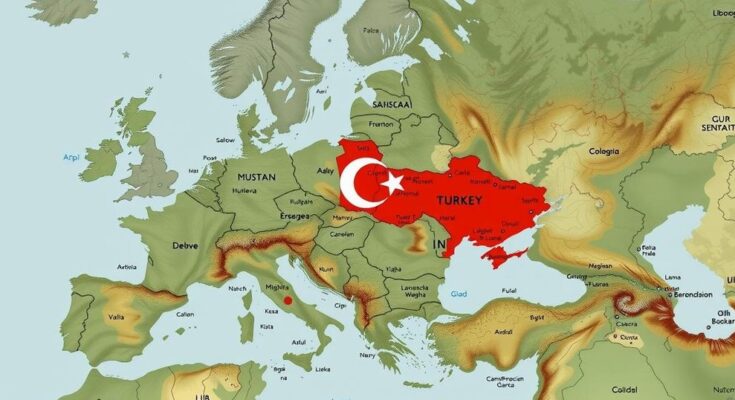Turkey asserts that European security hinges on its involvement, positioning itself as a key player amidst shifting U.S. policy. With significant military capabilities and a growing defense sector, Turkey has maintained ties with both Ukraine and Russia while emphasizing its indispensable role in European defense frameworks. Despite historical tensions with the EU, Turkey aims to enhance its influence in regional security dynamics.
Turkey, possessing the second-largest military within NATO and a significant Black Sea coastline, asserts its pivotal role in European security, especially in light of Washington’s shifting focus. Following crisis discussions regarding Ukraine and broader security issues, President Recep Tayyip Erdogan emphasized Ankara’s essential involvement. He stated, “It is inconceivable to establish European security without Turkey,” highlighting Turkey’s critical position in maintaining European defense capabilities.
A senior Turkish defense official reiterated this point, asserting that the reshaping security landscape makes Turkey’s involvement indispensable. He also mentioned Turkey’s willingness to contribute troops to Ukraine for peacekeeping missions if necessary. Turkey has consistently supported Ukraine’s territorial claims since the onset of Russia’s aggression in 2022, supplying essential military assets while managing its relationship with Russia without adopting sanctions against it.
Turkey’s unique geographical position has enabled it to engage both warring parties in dialogue. Erdogan and Foreign Minister Hakan Fidan have facilitated discussions by hosting leaders like Russia’s Sergei Lavrov and Ukraine’s Volodymyr Zelensky. Continued growth in Turkey’s defense sector, with exports projected to increase by 29 percent to $7.1 billion in 2024, underscores its importance in global defense, particularly with successful sales of the Bayraktar TB2 drones to over 25 countries.
IISS expert Tom Waldyn noted, “Sales to European countries, particularly EU members, add credibility to Turkey’s argument it is an important player in European security.” With a military presence of 373,200 active personnel and additional reservists, Turkey’s strategic role is significant, having been active in combat situations in Syria and Iraq against insurgents. Moreover, its stance on Ukraine aligns with international principles regarding sovereignty and territorial integrity, reinforcing its NATO membership status.
However, EU-Turkey cooperation faces challenges, particularly due to ongoing disputes related to Cyprus. Researchers like Nebahat Tanriverdi Yasar suggest Turkey’s balanced approach with both Kyiv and Moscow positions it uniquely as the EU seeks to bolster its security responsibilities. Ankara’s strategy may focus on mediation and deepening defense collaborations with select European nations while capitalizing on its defense production capabilities. Conversely, political scientist Sumbul Kaya cautions that Turkey primarily acts in its national interest, stating, “It only intervenes in neighboring countries for internal security reasons.”
This current geopolitical crisis provides Turkey with an opportunity to reaffirm its dual role as both a NATO member and an EU candidate, posing a chance to reshape regional security dynamics significantly.
In summary, Turkey’s centrality to European security is increasingly emphasized amid evolving geopolitical circumstances. With its strong military capabilities, commitment to Ukraine, and balanced relations with Russia, Turkey asserts that European defense cannot be effective without its direct involvement. While challenges remain within EU-Turkey relations due to historical issues such as the Cyprus dispute, Turkey’s strategic maneuvers could enhance its influence in the emerging European security landscape. The ongoing crisis illustrates the necessity for a pragmatic approach in addressing security needs and collaborations.
Original Source: www.kpvi.com




